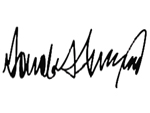Fine Line Between Thief and Entrepreneur
Question

Why is Donald Trump considered a “Captain of Industry” instead of a “Robber Baron”?
Answer
This provocative question contains at least four historical sub-questions: what’s a captain of industry? what’s a robber baron? what’s the difference? and is Mr. Trump either one? Clearly, there is also a judgmental tone to these terms – the first speaks of admiration, the second of condemnation – though by whom?
In America’s manufacturing age (c.1870-1970), “Captains of Industry” were men (always men, in my experience) who built and dominated an important section of the expanding US economy, then reached beyond their business interests to underwrite significant educational, cultural, medical or humanitarian projects. These individuals were our business statesmen, with Andrew Carnegie the classic example (libraries, an endowment for peace, an early fund for teachers’ pensions). Bill Gates and Warren Buffet are perhaps contemporary successors to the steel industry giant, both likewise making extensive philanthropic contributions. Robber barons, by contrast, achieved vast wealth by what many regarded as dubious means, even in the laissez-faire 19th century.
Tricky stock maneuvers, shady contracts, credit squeezes, and at times outright fraud defeated competitors and paved the way to monopoly power (or to oligopolistic power-sharing among barons). As well, they used spies, lockouts, and force to crush their workers’ efforts to increase safety, job security, and earnings. Jay Gould, the high-energy railway consolidator, and John D. Rockefeller, the oil magnate, may stand out from the historical crowd, whereas in our financial age, Enron’s top leaders and Bernard Madoff might qualify. Robber barons may be seen as successful entrepreneurs who value money and power above all else. However, in time the two categories can blend. For example, although Rockefeller schemed mightily to create Standard Oil, his later charitable foundations, carried on by heirs, profoundly rehabilitated a spotty reputation. A “pure” robber baron would laugh off the disdain (and the envy) the title conveys, enjoying his pirate status. Now, on to Mr. Trump. My online research suggests that those describing him as a captain of industry tend to be journalists generally unaware of the term’s historical roots. Now it stands as a rough synonym for “big businessman.” Trump clearly did not build a major industry – his family had long been involved in real estate development, a long-established field to which he apprenticed and in which he prospered, twice weathering sharp reverses, in the 90s and after the 2008 economic smash. Though he managed dozens of deals, he has won without fraud and has often lost. One observer notes wisely that the term “captain of industry” represents “primarily a perception of the selflessness of the industrialist in question.” Though Mr. Trump has made many charitable donations, his successful self-promotion has made him a celebrity, so much so that condo developers have licensed his name, providing him an 8-15% royalty on gross sales. Thus, my sense is that Mr. Trump is neither a captain of industry nor a robber baron, but instead an extraordinarily-gifted entrepreneur who has transformed himself into a global brand.
For more information
Blair, Gwenda. The Trumps: Three Generations That Built an Empire, New York: Touchstone, 2001.
Chernow, Ron. Titan: The Life of John D. Rockefeller, New York: Random House, 1998.
Klein, Maury. The Life and Legend of Jay Gould, Baltimore: The Johns Hopkins University Press, 1986.
Nasaw, David. Andrew Carnegie, New York: Penguin, 2006.
Tarbell, Ida. The History of the Standard Oil Company, New York: Cosimo Books, 2009 (reprint of 1904 edition).
Bibliography
Chandler, Alfred D.Jr. The Visible Hand: The Managerial Revolution in American Business, Cambridge, MA: Harvard University Press, 1977.
Colihan, Christine and Amy Vitcusky. The Great Industrialists: Captains of Industry or Robber Barons. Industrialization. August 2006. (for an 11th grade lesson plan on captains of industry vs. robber barons)
Fitch, Stephane. "What is Trump Worth?" America's Richest. 21 September 2006. (on licensing his name)
Josephson, Matthew. The Robber Barons: The Great American Capitalists, 1861-1901, New York: Harcourt, Brace and World, 1962.
NYPhilanthropist. "Donald Trump." 2010.
Pollick, Michael. "What Is A Captain of Industry?" wiseGeek 08 September 2010. (for ‘selflessness’)
